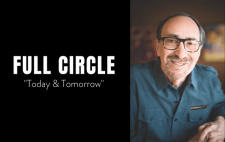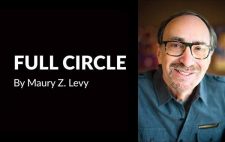My mother said there’ll be days like this.
“There’ll be days like this,” my mother said. “You have to decide. Is this the beginning of the end or the end of the beginning?”
Conundrum. A riddle wrapped in a ruggie. It was, in fact, a new beginning. A choice between money and wealth. And I chose wealth. Wealth of knowledge, knowledge that paid off, but knowledge without pay.
I left the hardware department at Sears, where I sorted and sold ratchets for $1.25 an hour, and entered the 50,000-watt world of free radio. It was a full-time job that paid in wisdom, a job measured in mentorship.
And my mentors, as fortune would have it, were very good at what they did. I learned interviewing from Jack McKinney, writing from Pete Hamill, editing from Dick Schaap and life from Norman Mailer.
In return for all I learned, I worked 12 hours a day for eight nights a week. I earned knowledge that no one in college could ever teach me. What I didn’t earn was money. But, as my mother once told me, life has its tradeoffs. And life has its payoffs.
Fast-forward from those days at WCAU radio to two years later. I’m in my office at Philadelphia Magazine, and the receptionist calls from the lobby. “There’s a girl out here who wants to work for you,” she says.
“Tell her we’re not hiring,” I said before hanging up. The phone rings again. “She says she won’t leave until you talk to her.”
Pretty persistent, I thought. So I went out to the lobby to meet her. Her name was Jane, and she was a student at Penn. “I want to be your intern,” she said.
“But we don’t have an intern program,” I told her.
She just smiled. “Now you do,” she said.
“I absolutely can’t pay you,” I told her.
“Don’t worry,” she said, “this will pay.”
And so it did. Jane Amsterdam went on to earn bylines at Philadelphia and then jobs. With my full recommendation, she became the first editor of New Jersey Monthly. And then editor of the style section of the Washington Post, and then the editor of Manhattan, Inc. and then the editor of the New York Post. Not bad for a kid who didn’t get paid.
Once word got out, the free interns kept coming. There was Eliot Kaplan, who became managing editor at GQ, then editor of Philadelphia and now a major executive with Hearst publications.
And there was Ellen Goosenberg, who you recently saw on TV. She became a director and producer – first, with a local New York station, then with VH1 and, finally, with HBO Documentary Films. You probably saw her giving her acceptance speech at the Academy Awards in February. She won the Oscar for Best Documentary Short Subject. You could say I saw it coming. After all, she’d already won four Emmys and a Peabody.
Would any of these interns rather have made a few bucks working at Wawa? Nope. It’s a message I give to every college kid I know. Money is good for you. Sacrifice is better. And if you make the sacrifice, the money will come.
It’s a message I gave my own kids. Scott interned on Capitol Hill when he was in college. He learned a lot and made connections he still uses, landing a job as CRO of one of the world’s fastest-growing tech companies.
Dan interned in the sports information office at Rutgers. He started as a designer. You’ve seen his Rutgers “R” on the back of half the cars in the state. Then he started a free podcast that led to the job he has now – national sports radio host on SiriusXM.
So as your kids and grandkids look for their summer jobs, you might want to point them away from flipping burgers at McDonalds. Money may be good for you. But sacrifice is better. You want fries with that?












